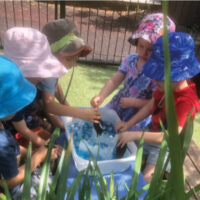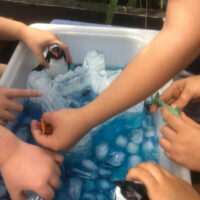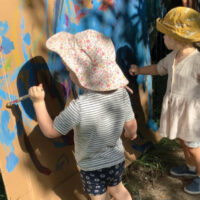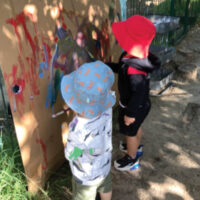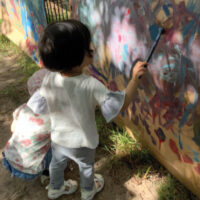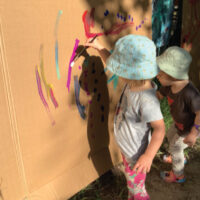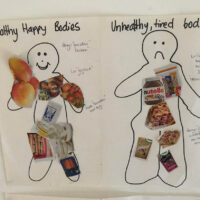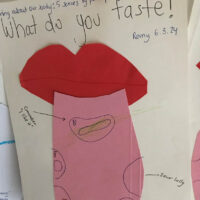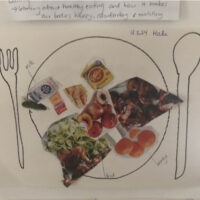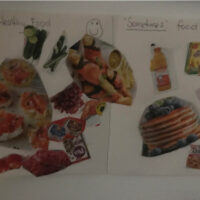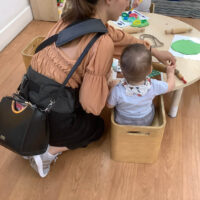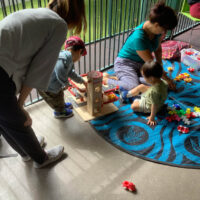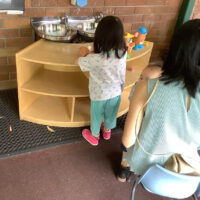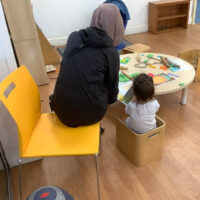Johnson House
Waratah Room
Story by Educator Andrew
In Johnson House Waratah room we have been exploring a sensory small world which we create together with ice.
Several ice trays with water were put in the freezer in preparation for the small world play and we also filled a silicone castle mould with water to freeze. Our patience was rewarded with an incredible icy play area that we could all enjoy.
To create this small world, we emptied the ice trays into a tub, then carefully removed the castle from the silicone mould. Blue food dye and water was also added, before also adding some cold climate animals for our small world dramatic play.
We decided to take our creation outside, and we enjoyed exploring it under the shade of a tree. It was an amazing experience, which saw the children share conversations and take on many different character roles within their play. Discussions about the feeling of the water and the ice on their fingers, hands and arms as they played were also had. We all agreed that the water was very soothing and felt nice on such a warm morning.
The more the ice melted, the more the game changed; as the water become deeper, we saw the animals enjoying more time below the surface, diving, swimming and doing tricks.
As we headed inside it was very clear that our icy play area needed to come too. We carefully carried it inside as at this stage the ice cubes had all melted, but the castle was hanging in there! We made sure that all the trays and the castle mould were refilled for next time, because we are sure this experience will be revisited soon!
Murray House
Jacaranda Room
Story by Educator Rosie
In Murray House Jacaranda room an open-ended experience of painting was setup outdoors using some large, recycled boxes. The large pieces of cardboard became the medium on which the children could paint and create. This experience encouraged the children’s creative development, as they mixed paints and worked on naming the colours they were using and it was also an opportunity for them to develop their social skills, as the worked collaboratively to create the artwork.
The children were engaged and showed interest in such a big task. They dipped their paint brushes into the coloured paints and identified the colours. They had the opportunity to increase their knowledge about colours, and they used their senses as they touched the paint. They used large movements to create strokes and to cover the cardboard in paint, including high and low strokes. The children practiced their creative skills as they made this bright and vibrant artwork.
Family Day Care Sydney Wide
Story by Educator Support Officer Alix
Family Day Care Educator Heidi has a unique ability to extend upon children’s learning in ways that are age appropriate and suited to their interests. A planned experience to gauge children’s knowledge on healthy eating led to discussions about why we need to eat (ie to grow and develop) which in turn led to discussions about the human body and the functions of our different body parts. The children were able to identify so many different areas and expand upon their original knowledge through thoughtful discussions and looking at concrete examples as exemplified in their artwork.
Community Playgroups
Story by Playgroup Coordinator Rebecca
Playing with your child is one of the most important things you can do with them. Children’s minds soak up everything around them. As they interact with you through play, your child’s mind is absorbing an abundance of information that aids in the development of many skills that they will use every day, such as gross motor skills, learning how to regulate their emotions and building leadership and team working skills. Playing with your child also helps to build strong parent-child relationships, as it brings you and your child closer together and helps to create a positive bond through fun and laughter.
As adults we sometimes feel silly or awkward when we are doing pretend play or taking part in child-like behaviour. Don’t panic! All you really need to do to play with your child is to be with them, to actively observe, listen to and support them in how they want to play, and to talk with them about what they are doing.
Sorting toys and doing puzzles with our children helps them to learn about numbers and shapes. Telling stories and doing pretend play helps to develop your child’s social and emotional skills and increases their language skills through the back and forth of conversation. Outdoor games, such as throwing and catching, build motor skills and physical development.
Playgroups are the perfect place for us to practice our play skills as adults!
